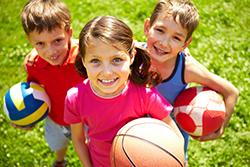- posted: Aug. 04, 2017
Like all pediatricians in Raleigh, North Carolina, and beyond, we at Carolina Kids Pediatrics spend a good bit of our summer completing  sports physical forms – and a fair bit of the rest of the year managing some of the injuries that result from sports.
sports physical forms – and a fair bit of the rest of the year managing some of the injuries that result from sports.
In last week’s blog, we talked a little bit about how to prepare your child for an upcoming sports season. This week, I’d like to address a few common sports injuries, and how to recognize them.
As a pediatrician in Raleigh, NC, these are some of the most common sports injuries I see, and what to do about them:
PATELLOFEMORAL STRESS SYNDROME: A common issue in teenagers – the complaint is usually a vague pain around the knee cap that worsens with going down stairs or squatting. This is caused by uneven movement of the knee cap across the knee joint, leading to inflammation and pain behind the knee cap. It’s often fixable with low-impact exercises that strengthen and stretch the thigh muscle and help it hold the knee cap in the right place as it moves.
ANKLE SPRAIN: This is usually due to stretching or tearing of the ligaments on the outside of the ankle when the foot turns in during a stumble or fall. An ankle brace or wrap, elevation, ice for the first day or two, and crutches for 2-3 weeks may be needed depending on the severity of the injury. What’s even more important is rehabilitation after the sprain. When the brace comes off, it’s important to strengthen the ankle before going back into full sports mode. Simple exercises like tracing the alphabet in the air with your toes are a start, with a gradual increase in training and activity until the ankle is strong enough for running and jumping. Kids get into trouble when they go straight from wearing an ankle brace to participating fully in their sport without proper rehabilitation.
OSGOOD-SCHLATTER DISEASE: Doesn’t that sound awful? It’s not as bad as it sounds, but it does hurt. The bony bump right below the knee cap (called the tibial tuberosity) has a growth plate in growing tweens and young teenagers. With a lot of running and jumping, this one spot right under the knee cap can become painful and swollen. A flexible knee brace can help, as can ibuprofen and ice. However, the ultimate cure happens when this bone stops growing in the mid to late teen years.
SEVER DISEASE: Same problem, different spot. There is a growth plate in the back of the heel which can become painful and inflamed with running and walking in tweens and young teenagers. The treatment is heel cord stretching, sometimes a soft gel heel lift in the shoe, and pain medications like ibuprofen.
SHIN SPLINTS: Pain in the shins with running can be due to swelling in some tight spaces, or compartments, in the front of the lower legs. If this is the case, ice and ibuprofen are the immediate treatment, and the pain should go away quickly with rest. It can be useful to decrease the intensity of training, and build up more gradually toward a goal. However, if pain continues at rest, particularly if it always remains in one spot, this can be a sign of a stress fracture (small break in the bone from over-exertion) - this may need orthopedic treatment and a prolonged period of rest and rehabilitation.
LITTLE LEAGUE ELBOW: If your young pitcher frequently hurts on the inside of his/her elbow, beware. There are growth plates here too, and pain on the inside of the elbow in a growing pitcher can be a sign of bone injury in this location. If it goes untreated, it can require surgery to heal, but injuries caught early can often be treated with rest and physical therapy. Be sure your child’s coach follows strict pitch limits – no more than 350 throws per week – to avoid this problem. A similar problem is also possible higher up – “Little League Shoulder”, which involves the growth plate in the upper arm.
A nice website for reading more is https://www.niams.nih.gov/health_info/sports_injuries/child_sports_injuries.asp#most - or call your pediatrician at Carolina Kids Pediatrics if you’re worried about a sports injury!
Locations
2605 Blue Ridge Road, Suite 100
Raleigh, NC 27607, US
Hours of Operation
Weekend hours are same day appointment only for urgent matters and newborn hospital follow up.
8:30 am - 5:00 pm
5:00 pm - 6:30 pm: after hours, same day by appointment
8:30 am - 5:00 pm
5:00 pm - 6:30 pm: after hours, same day by appointment
8:30 am - 5:00 pm
5:00 pm - 6:30 pm: after hours, same day by appointment
8:30 am - 5:00 pm
5:00 pm - 6:30 pm: after hours, same day by appointment
8:30 am - 5:00 pm
5:00 pm - 6:00 pm: after hours, same day by appointment
9:00 am - 1:00 pm
Limited availability. Call when we open to schedule.
9:00 am - 1:00 pm
Limited availability. Call when we open to schedule.
